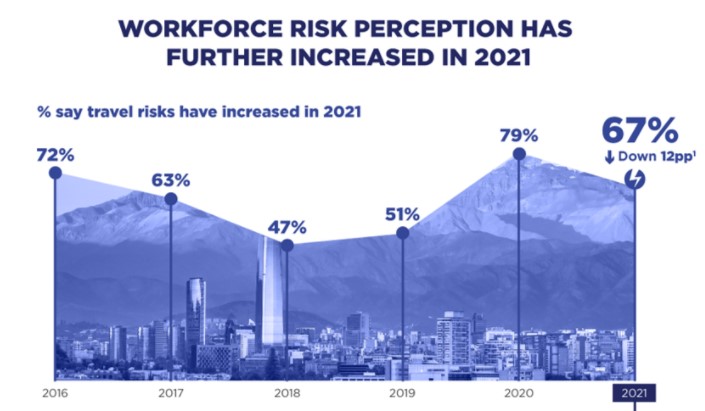The risk management community anticipates that travel and working patterns may stabilise by the end of 2022, according to a report published today.
Working practices and employee expectations have changed radically as a result of the pandemic, as WFH has become entrenched, and 9 to 5 in the office is only for the minority, according to International SOS' Risk Outlook 2022.
The firm's report, which is based primarily on a survey of nearly 1,000 risk professionals across 75 countries, suggests that just 15% of respondents plan to work five days per week at their office or onsite – in a considerable change from pre-pandemic patterns
Business travel is expected to face a continuing period of disruption, with 44% of respondents believing it could take at least a year for travel to settle and 15% expecting a ‘new normal’ could take up to two years to appear. The outlook is different between regions, however. Some 40% of European respondents are optimistic that new routines of business travel will be established in the next six months. Respondents in Asia anticipate that it will take longer, suggesting that many Asian countries zero Covid policies may be delaying the return to stability.
Only 54% of the survey's respondents were willing to travel internationally for work. This compares with 73% willing to travel domestically. This figure is also above the figure for those prepared to travel abroad on holiday, which only 47% said they were willing to do.
James Bird, security director, Intelligence and Assistance at International SOS, said “There is job for organisations to build back confidence. Employers are still working out what can be done remotely and what requires that face-to-face interaction. While business travel is picking up again, it is not as straightforward as it was. Rapidly changing travel restrictions and testing requirements mean that crossing borders can be complicated.
"For organisations managing travel programmes it’s vital that they are proactive in understanding the risks – logistical, security and health – and provide the necessary support to employees. A vital element is having access to accurate and up-to-date insight which can help travel function smoothly. This insight needs to account for new and emerging risks, such as new Covid variants or security concerns and disruptions.”
Printed Copy:
Would you also like to receive CIR Magazine in print?
Data Use:
We will also send you our free daily email newsletters and other relevant communications, which you can opt out of at any time. Thank you.











YOU MIGHT ALSO LIKE